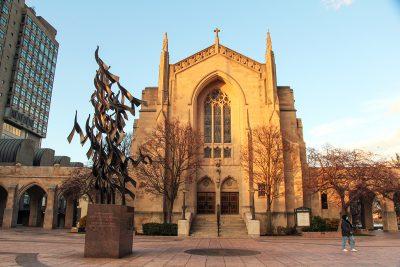
Black students, staff and faculty at Boston University shared their experiences as members of a minority group on campus and their thoughts on the University’s handling of racism in recent months.
Many students cited on campus groups such as Umoja, the Black Student Union and Sisters United as positive resources for those looking to connect with others of the same background.
“It’s been a good experience,” said Nicole Agwu, a freshman in the Sargent College of Health and Rehabilitation Sciences. “There’s not a lot of us so we can have a sense of community.”
While it is nice to find a community within cultural clubs at BU, she said she would appreciate seeing more students of color on campus.
“I feel like it’s more diverse than other schools but it’s still not,” Agwu said. “It’s still pretty hard to find other people like me.”
Many students also reflected on the racism they faced on campus.
College of Arts and Sciences freshman Brianna Bourne said she has experienced microaggressions at BU — instances in which the discrimination was subtle and indirect.
“Security guards would let other students, who I noticed were white, just walk in but once it was me I was stopped and they said ‘let me see your badge and your card,’” Bourne said, “and they looked very hard at it even though they see me walk in and out at least ten times, they’ll still ask.”
Despite such incidents, Bourne said she sees BU making progress with resources such as the Center for Antiracist Research and the recent unveiling of the BU Newbury Center that will provide support for first-generation college students.
“They’re working towards an anti-racist environment,” she said, “but at the moment, it’s not 100 percent anti-racist.”
Bourne added that while many resources may exist, they are not of much use if the knowledge is not widely available.
“I haven’t really looked at the Antiracist Center because I feel like there’s not a lot of information about it,” she said. “It’s just that we have an Antiracist Center, it doesn’t really say anything about it.”
However, students have also acknowledged the University’s effort to promote conversation and change regarding racial issues.
College of Engineering sophomore Michael Igwe said he had seen articles on the issue in BU Today, the University-run daily online newspaper.
“I think that’s the most I’ve seen,” Igwe continued. “I’ve seen a protest outside or something like that. But yeah, they seem to be keeping track of it on their BU Today website.”
In addition to student groups, other race-related resources on campus include the Howard Thurman Center for Common Ground and several formal lectures and discussions held over Zoom. Igwe said he recalls attending one such discussion on Black professionals in technology and engineering.
“Starting the conversation is always good,” he said.
Following the death of George Floyd and continued police violence, several academic departments within BU released statements as well.
Chair of the Political Science department Neta Crawford released a message to students.
“These events are, sadly, not new,” she wrote. “However, the United States is in an unprecedented moment — a recognition of police violence, widespread protest, and the threat of a militarized response to democratic protest.”
Below her introductory message followed several statements from political science professors expressing their strong opposition to the racial inequality prevalent in the United States.
“As far as I know of what they posted, in my keeping up with it, I think it was an adequate response,” Wheelock College of Education and Human Development freshman Ambrozine Daring said.
Jessica Adejobi, freshman in the College of General Studies, said she saw the University’s response to protests this summer as a way to cater to people of different viewpoints.
“I understand their point from an institution that they have to accommodate to everyone,” Adejobi said. “So that’s to say people with different views do go to this school so we do have to accept that, but at the same time I think they could have done more.”
Increasing diversity on campus is an area she said could be improved, but she understands the nuances of the situation.
“They could always be doing better in my opinion,”Adejobi said. “But at the same time, I don’t know how the admissions process works or anything, but you can’t just admit somebody because they’re a minority.”
Warren Towers employee John Walker said he had an overall positive reaction to BU’s handling of racial issues.
“When it comes to diversity on campus, I think it’s doing a very good job,” he said. “But when it comes to African American and the people of color, I think it’s up to the people themselves that want to come to college.”
Walker noted one possible way of increasing diversity was having outreach programs for students in certain areas.
“Maybe if they had programs to reach out to people in certain neighborhoods, that could be a way to get people,” he said.


















































































































